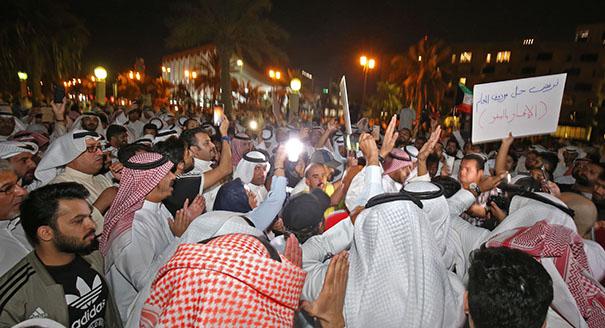Corruption has become a staple of governance and a feature of everyday life in Kuwait. The unraveling of multiple major corruption cases in the past few weeks has shaken society to the extent that the 30th anniversary of Iraq’s invasion was overshadowed by discussions of corruption and has become a convenient metaphor for the current state of affairs.
Corruption has amounted to an internal invasion, threatening the fabric of the state and its ability to function. It has reached unparalleled proportions and includes a complex web of users and processes. However, corruption in Kuwait involves more than embezzlement and money laundering. It is a five-tiered system whose components intersect and feed off one another, making it harder to uproot. If state and society are sincere in tackling corruption, they should first address corruption in its totality, or it will fester.
The cornerstone of corruption is wasta, the use of connections and influence to garner favors. It comes in different forms: bribes, nepotism, unwarranted services, waived fees, inflated evaluations, and circumvented laws. It produces a contagious attitude that perpetuates gross negligence, inefficiency, and suboptimal work performance. Executing a mundane task in various quarters more often entails distributing “gifts,” whether monetary or material goods.
So pervasive is wasta in the system that an International Monetary Fund report found that among Gulf populations Kuwaitis mentioned it most often as a prerequisite for getting a job, while among the populations of the Middle East they were the third to do so. Kuwait’s vital oil sector has not escaped cronyism either, nor has the illegal distribution of state farmlands. Much has been written about wasta, but accommodating wasta as ordinary routine has allowed relatively junior deviant practices to snowball into larger cases of corruption.
The second layer of corruption involves exploiting the system to engage in fraud, which complements wasta. A prime example is the scandal of forged advanced degrees secured by officials and academics. Some companies have not escaped this predicament either, presenting distorted balance sheets, while thousands of Kuwaitis fake their employment status in the private sector to receive public funds encouraging people to leave the bloated public sector.
Faking sickness, another dimension of fraud, has also been part of this circle of corruption. The state spent $3.5 billion in the first nine months of 2018 alone on treatment abroad for its citizens, of which several cases were discovered to be tourists masquerading as patients. Many of them ended up in U.S. hospitals where fees totaling $677 million have remained unpaid. This prompted the State Department and Congress to issue statements imploring Kuwait to settle its bills. Disability claims have also been exploited, with individuals pretending to be disabled to benefit from financial incentives.
The first two layers of corruption are often invisible, but they are corruption’s lifeline. Associating corruption with illicit financial gain alone has breathed life into a culture rooted in wasta and fraudulent behavior. So widespread is this culture that many otherwise law-abiding individuals are forced to partake in it or else risk delays and complications. Normalizing or trivializing such practices enables the exponential growth of misconduct.
Falsifying one’s citizenship status and human trafficking are a third tier in Kuwaiti corruption. The poor treatment of the bidun, or stateless inhabitants of Kuwait, has pushed them to pursue illegal methods to satisfy their needs. Examples include posing as members of another community to make ends meet or paying to obtain long-sought documents. Illegal labor trafficking involving hefty sums imposed on foreign laborers has profited members of the ruling family and influential figures described as visa merchants. This has partly led to a population imbalance and increased xenophobia.
Kuwait has also become an international hub for money laundering, a fact picked up by international media. This fourth layer of corruption has galvanized many Kuwaitis given its intrigue and the alleged involvement of a senior member of the ruling family currently under investigation for facilitating money laundering. The case is connected to the 1Malaysian Development Berhad sovereign wealth fund and the involvement of Syrian and Iranian operatives speaks to Kuwait’s international entanglement. Several social media influencers are also being investigated for receiving millions of dollars from suspected money laundering operations, knowingly or unintentionally.
Embezzlement attracts the most attention given the associated persons and sums. But this fifth tier is the tip of the iceberg. Kuwait’s financial integrity has been shattered across myriad institutions and domains. These include social security, the army fund, defense procurement, the “hospitality money” of the Interior Ministry, Kuwait Airways, sports, the Port Authority, municipalities, petrochemicals, oil, parliament, and the list goes on. Adding insult to injury is the fact that legal cases never seem to identify the guilty. Yet it is not for the absence of oversight. Twelve bodies “fight” corruption, but many of them are either toothless or incapable. Combating corruption is hindered by overlapping bodies, insufficient laws, and a lackluster attitude driven by a narrow view of corruption.
Kuwait’s ranking in corruption indices keeps falling year after year. The country must rethink its conception of corruption and the limited tools it has to combat it. Education should be used to teach ethics to youths in the context of an integrated view of corruption. Society and nongovernmental organizations should expose the elaborate infrastructure of corruption in everyday practices. Politicians need to reorient their fight against corruption so that it encompasses all five tiers.
Finally, the government should centralize its efforts under empowered, respected anticorruption czars. A new government is expected in December. Fighting corruption should be its primary goal, based on a revamped holistic understanding, or else the current anticorruption mood might fade away. Corruption in Kuwait represents an existential threat for the country. Failure to address it bodes ill for the country’s reputation, wellbeing, and survival.






